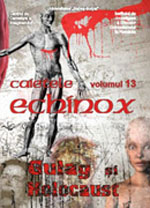Holocaust şi totalitarism comunist în textele de psihoistorie
Psychohistorical Perspectives on the Holocaust and Communist Totalitarianism
Author(s): Ştefan BorbélySubject(s): History
Published by: Universitatea Babeş-Bolyai
Keywords: Holocaust; totalitarianism; communism; psychohistory; utopian socialists.
Summary/Abstract: By putting together skills belonging to the methodological framework of classical psychohistory (the relation between group fantasies and childhood trauma, the temporal shifts in generational social psychodynamics explained by the intertwined regressive fantasy of blood purity and maculation etc.), the essay interprets both the Holocaust and the communist totalitarianism as political mechanisms of paranoid, extreme social engineering that result in the lust of continuously generating marginalized victims: racial ones, in the case of the Holocaust, ideological ones in the case of communism. The essay argues that both the Nazi regime and the communist totalitarianism were built on the fantasy of a self-purifying brotherhood: by saying this, the author challenges the typical view of conceiving Hitler and Stalin as substitute father-figures, and sets out the idea that the social mathematics of confraternity, inherited from the utopian socialists of the 18th century, functioned in both disciplinary systems as a normative mechanism of generating ceaseless paranoid struggles among allegedly equal “brothers”, whose prerequisite condition was to set the “fatherly” system itself outside any challenge, that is to treat it like an unquestionable, absolute embodiment of a religious myth.
Journal: Caietele Echinox
- Issue Year: 2007
- Issue No: 13
- Page Range: 26-32
- Page Count: 7
- Language: Romanian
- Content File-PDF

